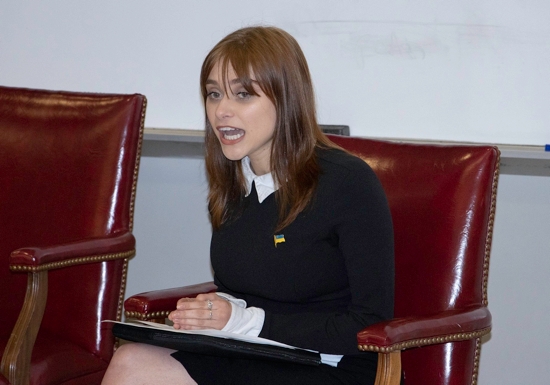
For Lydia Korostelova, Russia’s brutal invasion of her native Ukraine has hit home in ways she could never have imagined.
“People are leaving their homes, leaving everything behind,” she said of her hometown of Huliaipole in eastern Ukraine during an April 7 panel discussion at The Catholic University of America in Washington.
The town, 90 miles from the besieged city of Mariupol, has seen its population drop from 13,000 to about 2,000 as people have fled to safety, the 23-year-old student at the university’s Columbus School of Law said.
A recent New York Times article about Huliaipole quoted a 64-year-old woman sheltering in a basement of the town’s hospital who said life there now is “like living in a horror movie.”
For Korostelova, who has been receiving eyewitness accounts from family members and friends in Ukraine, that horror is all too real.
“They (the Russians) are killing Ukrainian civilians every day,” said Korostelova, whose presentation included a series of photos of bombed homes, markets, roadways and railroad tracks, and a centuries-old church with its bell tower in ruins.
Korostelova showed a picture that she took of her family while she was at home during Christmas break. “It’s the last I have of that kind,” she said.
Then she spoke words of another horror from back home in Ukraine.
“My brother, he’s supposed to turn 25 on April 17, but he won’t, because he was killed on March 9,” she said, her voice breaking. “He was a very patriotic, dedicated young man.”
Korostelova noted how her father and brother had stayed in the town, helping however they could, including getting water to residents and assisting with other relief and defense efforts.
In an emotional voice, she explained how her brother Yevhenii died.
“He and his friends, who also died, they were driving in a car outside my hometown to deliver humanitarian aid to people in the nearest village. It was a volunteer mission, they were never involved in any military practices, it was just helping people to survive, and the road was mined,” she said.
Remembering her brother, who was called Zhenya, she said, “He was very bright. He was getting his Ph.D. in agriculture. He was published, he was traveling around the world, doing great things.”
Korostelova also described how residents hide from constant shelling and artillery fire.
“All this time, people are surviving how they can,” she said. Some residents have not made it, including a friend’s grandmother who went outside to breathe fresh air after being in hiding, and then was killed when a bomb fell in her backyard.
“Some people have no ability to bury loved ones, so they’re forced to bury them in their gardens or backyards,” Korostelova said, adding that in villages near her hometown young women reportedly have been kidnapped and raped by Russian troops.
Other panelists connected the war and people’s suffering to Lent, a time of repentance and growing closer to God.
“We’re here in Lent, coming up on Holy Week, so we’re really in this moment between suffering and hope, and that’s where we are in the war in Ukraine as well as in our response to it,” said panelist Maryann Cusimano Love, associate professor of international relations at Catholic University, who spoke via an online connection.
Noted for her work with the Pentagon, the State Department and the U.S. Conference of Catholic Bishops, Cusimano Love identified several myths connected to peacebuilding, including that it is something that only begins after a war and that it is only the province of governments.
Peacebuilding, she said, must commence during the war through actions that foster participation, restoration, right relationships, reconciliation and sustainability.
“We all have a role to play. We all have things we can do that will help set the table to build a more sustainable, just peace for Ukraine,” she said.
In his talk, Father Peter Galadza, a Ukrainian Catholic priest from Canada who is a visiting professor of liturgy at the university, noted several ironies connected to the Russian invasion.
“In 1994, Ukrainians voluntarily gave up their entire nuclear arsenal, and the Russian government at the time signed a document pledging to respect Ukraine’s territorial integrity,” he said.
Twenty years later in 2014, Russia occupied and annexed the Ukrainian territory of Crimea and began providing military assistance to Russian separatists fighting in Ukraine’s eastern Donbas region. Then Russia launched its invasion of Ukraine Feb. 24.
Father Galadza said that while “Ukraine has shown itself to be a model of cultural and ethnic pluralism,” Putin has framed the invasion as an effort to “protect” ethnic Russians in Ukraine and the war has received the support of the head of the Russian Orthodox Church.
Russian Orthodox Patriarch Kirill has expressed hope for a peaceful resolution, but he is a staunch ally of Russian President Vladimir Putin and has supported Russia’s actions. More than 280 Russian Orthodox priests around the world recently signed an open letter condemning the attack on Ukraine.
Father Mark Morozowich, a Ukrainian Catholic priest who serves as the dean of the university’s School of Theology and Religious Studies, emphasized that Russia’s invasion began long before Feb. 24, saying that since 2014 more than 20,000 people have died in fighting in Donbas.
He explained that while Russian Orthodox Patriarch Kirill has backed the invasion and has framed it as “saving people from the ills of the West,” Russia has one of the world’s highest abortion rates, has no freedom of speech and has been arresting thousands of citizens protesting against the war.
“It really is an ideological war fought against a way of living,” he said, agreeing with Father Galadza that Ukraine not only prizes its freedom, but has been a country where people of different cultures, faiths and ethnicities have lived together.
“This idea of exchange, of freedom is what Putin is fighting against. … This is about domination,” he said.
Zimmermann is editor of the Catholic Standard, newspaper of the Archdiocese of Washington.



